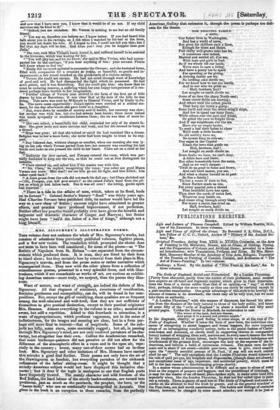„MRS. SIGOURNEY'S ILLUSTRATED POEMS.
Tars volaine does not embrace the whole of Mrs. Sigourney's works, bat consists tif selections from previously published volumes, fugitive pieces, and a few new -verses. The resolution which prompted the choice does not-seem to have been well considered; for some of the pieces—as "The Retina of Napoleon from St. Helena "—are separated from the circum- stances which produced them. It is true, they are fitted by their form to Stand alone; but they certainly lose by removal from their place in Mrs. Sigourney's travels, and from the prose notes or rather narrative which accompanied them. They now with the other pieces form a collection of miscellaneous poems, presented in a very splendid dress, and with illus- trations, which if not remarkable as works of art, are curious as exhibit- ing American nature—more truly, we suspect, than the poems they illus- trate.
Want of nature, and want of strength, are indeed the defects of Mrs. Sigourney. All that elegance of sentiment, sweetness of versification, feminine gentleness and susceptibility, can do, will be found in her com- positions. But, except the gift of versifying, these qualities are so frequent among the well-educated and well-bred, that they are not sufficient of themselves to give poetical distinction, except to their poetical originator Mrs. Hemans. Almost everything in the volume is an echo ; musical and sweet, but still a repetition. Added to this drawback to attraction, is a want of appropriateness, which produces vagueness, not in the sense of indistinctness, for the images and meaning are clear, but in a form per- haps still more fatal to interest—that of ineptitude. Some of the sub- jects are lofty, some stern, some essentially rugged ; but all, in passing through Mrs. Sigourney's mind, are not only rendered partakers of its cha- racter, but altogether lose their own. Collins the Academician remarked, that some landscape-painters did not perceive or did not allow for the difference of the atmospheric effect in a room and in the open air, espe- cially in the country ; hence, many out-of-door scenes had an in-door look. Mrs. Sigourney and other imitators of Mrs. Hemans have carried this mistake a good deal further. Their poems not only have the air of the drawingroom or boudoir, but everything partakes of the nicknack refinement of the ladies' sitting-room. It might be thought that a strictly American subject would not have displayed this imitative cha- racter ; but it does if the topic is analogous to one that English poets have frequently treated. The stately character and wild freedom of the Red Indian, the bard labour of the sturdy backwoodsman, are turned into prettiness, just as much as the patriarch, the prophet, the hero, or the "baron bold," who are so continually transmogrified in Annuals. One piece in the book is an exception to these remarks, from the perfectly American feeling that animates it, though the poem is perhaps too deli- cate for the theme.
THE THRIVING FAMILY. 4-
A SONG.
Our father lives in Washington, 'r')1"" And has a world of cares °Da - "1"a11131)"
But gives his children each a farm, Enough for them and theirs.
Full thirty well-grown sons has he, ,,4L6Irdid.„:-;;
A numerous race indeed, Married and settled all, d'ye see,' With boys and girls to feed. So if we wisely till our lands, "al
We're sure to earn a living,°, now "Gs" - And have a penny too to spare cud 81&jf.;.' For spending or for giving. ,wr4:‘&1"1.A.!,
No lordling need deride us; vtdro raisin, , A thriving family are we,
For we know how to use our hands, :-.77i,6k71" And in our wits we pride us. '1 trax ■flaM """,- Hail, brothers, hail! ear
Let nought on earth divide us.
Some of us dare the sharp North-east; Some clover-fields are Mowing; And others tend the cotton plants That keep the looms a-going;
Some build and steer the white-wined ships,
And few in speed can mate them; While others rear the corn and wheat, Or grind the corn to freight them.
And if our neighbours o'er the sea llnll
als.■
Have e' er an empty larder,
To send a loaf their babes to cheer fi" We'll work a little harder.- - ''65Thl" 314,1 No tyrant king to ride oar an"rj7i11-:.'5n1' No old nobility have we
al. .sr",4 -su le
Enact the laws that guide t &V! Our sages in the Capitol
Hail, brothers, hail!
Let nought on earth divide us. nnw
Some faults we have, we can't deny, --(3. A 2"-j'''-d--) "4
A foible hero and there; Ass
But other households have the same, '441" V"'
And so we won't despair. " 'Twill do no good to fume and frown,' sdT ar, w "t=.
And call hard names, you see, ,q1, And what a shame 'twOuld be to part,. ,lik7-iobam,
So fine a family ! 'Tis but a waste of time to fret, odz Since Nature made us one, bet gatialaM1 For every quarrel cats a thread t,ep od That healthful Love has spun. rbilq
Then draw the cords of union fast, v..4 ,not-
Whatever may betide us, vo " And closer cling through every blast, i atikl For many a storm has tried us. '..nkxt.inaine Hail, brothers, hail !
Let nought on earth divide us.


























 Previous page
Previous page